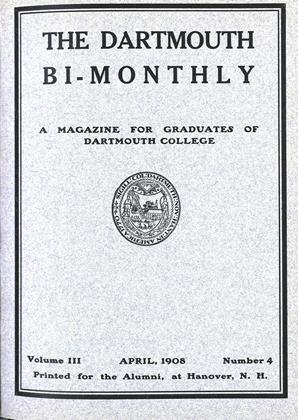The Dartmouth debating teams, March 2, won the championship of the triangular debating league by defeating Brown at Hanover, and Williams at Williamstown. Brown finished second in the league by defeating Williams in Providence.
The question for debate, of which the home team in each case upheld the affirmative, was: "Resolved: That in the larger New England cities all the powers of the city government should be vested in a commission of not more than nine men elected by the voters at large without the assistance of any other representative body."
Prof. L. H. Dow presided at the Hanover debate, which was held in Dartmouth Hall before a large and interested audience. The Dartmouth speakers were Clifford Stanley Lyon '10, of Holyoke, Mass.; Ben Ames Williams '10, Jackson, Ohio, and Ralph Lauris Theller '09, Cambridge, Mass. The Brown speakers, Clifton Henry Walcott '10, Leominster, Mass.; Donald Graham Clark '09, Portland, Me., and Donald Leroy Stone '09, Indianapolis. The judges were Judge M. J. Murray of Boston, Prof. J. S. Reeves of Dartmouth (who substituted for Prof. W. T. Foster of Bowdoin), and Prof. J. M. Barker of Boston University.
The arguments of the two teams may be summed up as follows: The affirmative showed that conditions in the larger New England cities today called for reform ; that the commission system had been tried with success in Galveston, Houston and other cities; that city government dealt essentially with admimstrative, rather than with legislative problems; that such government, therefore, to be efficient should be based on business principles; that commissions are checked by responsibilities to the people; and that far more able men are induced to accept office under the com. mission system . than under the aldermanic. system.
The negative emphasized the danger of concentrating authority in a few hands; argued that commission government was not representative; that it did not rouse the interest and offer the political educational field of the present system ; that it led to dishonesty of officials ; that it led to perpetuation of the control by a few men; that it was subject to corporate control, and that existing conditions could be remedied more surely by improving the present system than by introducing the new system.
Dartmouth's representatives at Williamstown were Phillip Minot Chase '09 of Boston, Ralph Joseph Richardson, Fairmount, Minn., and Warren Choate Shaw '10 of Lowell. The Williams speakers were W. A. Fullerton '08, M. L. Ernst '08, and H. W. Toll '09.
The affirmative presented reasons for the failure of the present system of city government and showed how commissions would remedy these evils, both in theory and in practice. Galveston an Houston were cited as examples of sue cessful government by commission, an. it was contended that conditions are the same in all cities, northern or southern. An analogy was also drawn between a business corporation and a city government, and the claim made that government should be along the lines of a corporation.
Dartmouth based its opposition to the proposed plan for New England cities on the ground that conditions in these cities were greatly exaggerated, that the evils were not due to the principles of the system of government, but rather to a lack of public interest and to minor faults, and that the success of the plan in two Southern cities did not warrant like results in New England. Also that city control necessitated representative legislation and division of the powers of the appropriating and spending of funds, neither of which the commission plan made allowance for. Lastly, that the plan proposed by the affirmative was dangerous, that it presupposed the election of perfect officials, and that failing these it offered unlimited chance for corruption and the operation of a political machine.
 View Full Issue
View Full Issue














